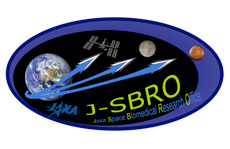Q. What are the future plans of the Space Biomedical Research Office?

Space Biomedical Research Office Logo
Space medicine is the ultimate preventive medicine, and the aim of our research is not just to benefit astronauts. Astronauts are humans like the rest of us - it's just that their workplace happens to be space. I would like to develop space medicine that will benefit all humans.
Mars is a different challenge for us because it's so far away, but it can teach us to approach medicine from different angles. Because the Moon is so close to Earth, in case of trouble, materials and food can be transferred from Earth relatively quickly, or in the worst case scenario, it is even possible to retreat to Earth. For Mars, on the other hand, we need to develop independent telemedicine, as it is too far from Earth to allow long-distance diagnosis and treatment.
It is also important to establish an effective recycling system for a confined space. This technology will be applicable to recycling and ecology on the Earth.
The study of Mars medicine promises to become of great value on Earth.
Q. What are your personal goals today?


Chiaki Mukai flew on the Space Shuttle in 1998, to carry out experiments in space. (Courtesy of NASA/JAXA)
As head of the research office, I have been focusing on cultivating new fields for researchers to develop. I have gotten to know many laboratories and scientists through my experiences of traveling to space and participating in a number of NASA experiments. With this background, I am cultivating new fields that only I can. The key is choosing what to plant, of course, so my job has also been creating the seeds. The seeds that have been sown are gradually starting to sprout, and some of them even might bloom and bear fruit next year.
Once an area of research starts to develop, I would like to pass it on to the young generation of researchers at the earliest stage possible. Research that brightens the eyes of young staff inspires and motivates them. I would like to manage the research office so that all our staff members feel they made the right choice in joining the lab.
Once an area of research starts to develop, I would like to pass it on to the young generation of researchers at the earliest stage possible. Research that brightens the eyes of young staff inspires and motivates them. I would like to manage the research office so that all our staff members feel they made the right choice in joining the lab.
Q. Do you have plans to go back to clinical practice in the future?


As I get older, I am becoming more empathetic to people's sorrow or other feelings that I could not see when I was young. In that sense, I could say that I would be a better health care adviser today. There are certainly types of illnesses that you are better able to treat as your life experience and understanding of hardship grow. When I look back at my career as a young doctor, I had technique, but there are some feelings of regret about not having been able to understand the pain or hardship my patients were going through. Having said that though, cardiac surgery, which was my specialty, requires working in a team, and I do not see myself going back to a clinical practice in that field. There is a slight difference between medicine and medical care: medicine consists of fields of education and research, and medical care is a clinical discipline where medicine is applied to help patients. At present, I am not doing clinical practice, but am working in education and research. I am now dedicated to make the best use of my work experience in and around space to contribute to these fields.